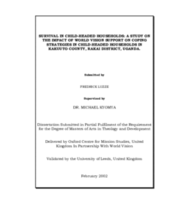Orphans living on their own in child-headed households are a new, but growing phenomenon, which has resulted from the overwhelming number of orphans caused by the HIV/AIDS scourge. With the traditional extended family and community support networks disintegrating, orphans in CHHs have had to depend on their own resilience by developing a continuum of coping and survival strategies. Any support to orphans in CHH especially by NGOs must be conscious of these dynamics, if coping capacities in CHH are to be enhanced in a way that creates sustainability in CHHs. The failure to appropriately enhance resilience in CHH it is hypothesised breeds dependency, jeopardising chances of survival in the event of NGOs withdrawal from CHHs.
This study has attempted to establish the effect of NGO intervention both on the coping strategies in CHHs and also on other community support systems. Because World Vision is a Faith Based Organisation, special emphasis is put on scrutinising the effectiveness of strategic initiatives especially with the dominant Church in the area.
Key findings from the study include the fact that the population of CHHs is still rising and that NGOs like World Vision are partly, though indirectly, responsible to the emergence of CHHs. Secondly, it was observed that CHH in areas where NGOs like WV were operating, were found to be heavily dependent on NGO support. Thus it was observed that this especially weakened community philanthropic initiatives towards CHHs. On the contrary, NGO intervention was seen to have potential both to strengthen coping capacities in CHHs and to destroy detrimental coping strategies. The sustainability of many NGO interventions in CHHs though very helpful was seen to be in doubt. Nevertheless, with careful interventions, CHHs can be strengthened to sufficiently contribute to the nurturing of orphans.
©Oxford Center for Mission Studies, University of Leeds, and World Vision

